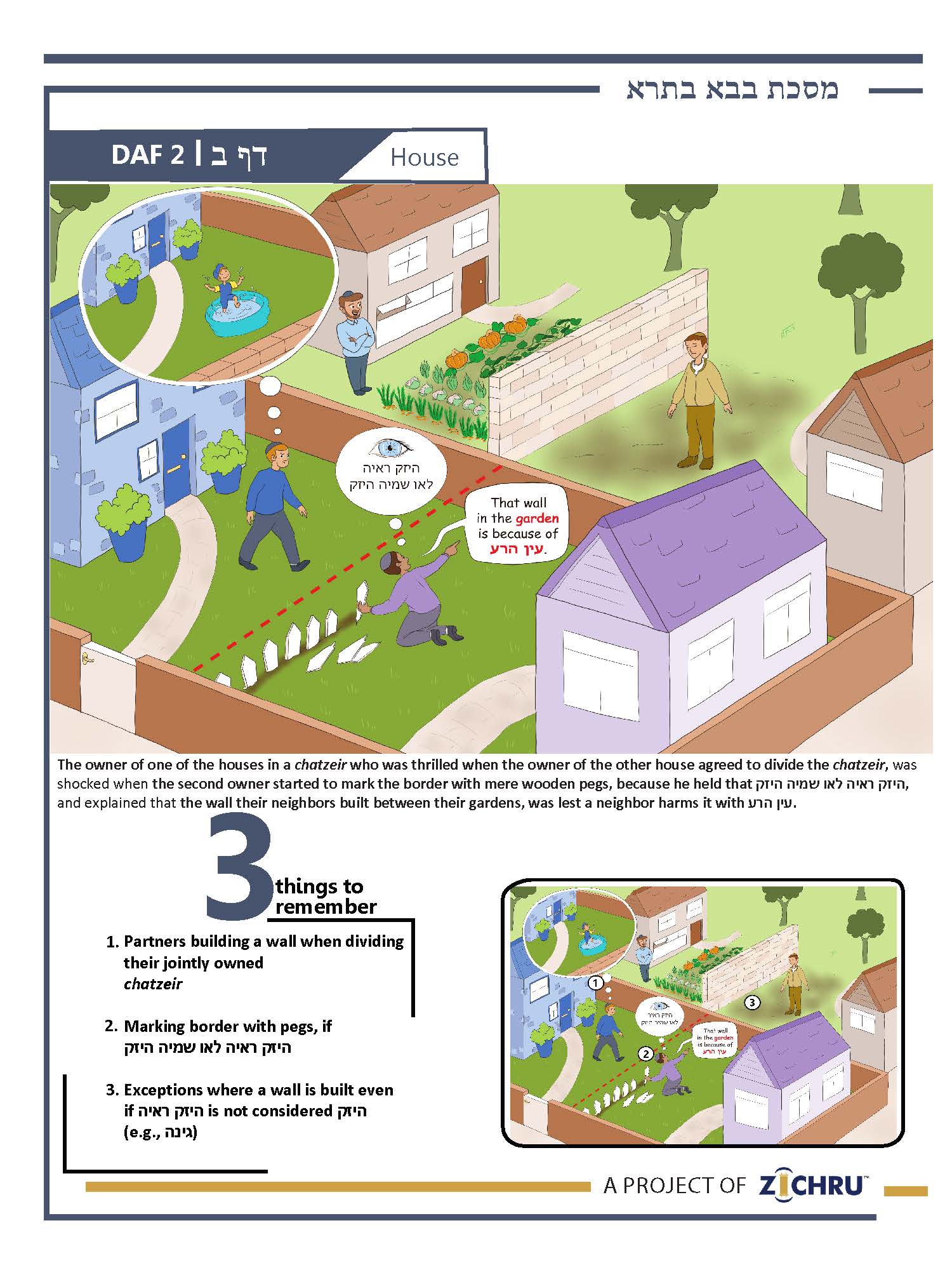Bava Basra - Daf 2
Audio Timestamps
0:00 - The 3 Sugyos
3:19 - Review of 3 Sugyos
6:06- Siman
8:37 - 4 Blatt Back Chazarah
16:40 - Pop Quiz (Last 7 blatt)
For access to all Zichru resources including PDFs, and illustrations CLICK HERE
- Partners building a wall when dividing their jointly owned chatzeir
The opening Mishnah states: השותפין שרצו לעשות מחיצה בחצר – Partners who agreed to make a partition in a courtyard they previously owned jointly, בונין את הכותל באמצע – build the wall in the center, with half of the wall on each partner’s land. The building materials and depth of the wall follow the local custom, as the Mishnah illustrates. Since each must provide the land and materials for half of the wall, לפיכך אם נפל הכותל – therefore, if the wall eventually fell, המקום והאבנים של שניהם – the place and the fallen stones are assumed to belong equally to both. The Mishnah continues that similarly, in a גינה – garden, in a locale where people customarily build partitions between gardens, each partner must contribute half the land and materials. However, בבקעה – regarding a valley, in a locale where people do not customarily build partitions, we do not require the partners to contribute to a wall. If one chooses to build a wall, כונס לתוך שלו ובונה – he must enter into his own field and build it, and marks the outside of the wall to indicate it is his. Then, if it later falls, the place and stones are his.
- מאי מחיצה, and if היזק ראיה לאו שמיה היזק
The Gemara analyzes the first clause of the Mishnah, and explains: מאי מחיצה – what is the “mechitzah” the partners agreed to make? גודא – A wall (this usage is demonstrated from a Mishnah). This implies that they are only required to build a wall if they agreed to do so, but if one party wanted to mark the border with wooden pegs, he is not compelled to build a wall. אלמא היזק ראיה לאו שמיה היזק – We see from here that visual “damage” by seeing a neighbor’s private activities is not considered damage, so he is not required to avoid it. The Gemara asks that perhaps the word מחיצה here means "פלוגתא" – division, meaning that by merely agreeing to divide the property, each party must contribute towards building a wall, because היזק ראיה is considered damage!? It answers that if so, the Mishnah would have simply said "שרצו לחצות" – who agreed to divide, not who agreed “to make” a מחיצה. In another version on the next Daf, the Gemara does interpret מחיצה as "פלוגתא", teaching that after merely dividing the property, they are required to build a wall, because היזק ראיה is היזק.
- Exceptions where a wall is built even if היזק ראיה is not considered היזק (e.g., גינה)
The Gemara asks a series of questions challenging the assertion that היזק ראיה is not considered היזק, and concludes with five exceptions where a wall must be built:
(1) גינה – a garden requires a wall, because Rav forbids standing by someone’s field which contains a standing crop, lest he harm it with עין הרע.
(2) נפל – a pre-existing wall which collapsed must be rebuilt, since they originally agreed to build a wall.
(3) הזיקא דרבים – damage from the public gazing into a common courtyard is definitely damage, and all residents must contribute to a wall.
(4) הזיקא דבית – visual damage to a home is definitely damage, since private activities are commonly done there, so one cannot construct a wall at a height from which he can gaze into his neighbor’s window.
(5) גג הסמוך לחצר חבירו – if one’s roof adjoins his friend’s courtyard, he must build a fence four amos high, because the chatzeir’s owner can say: לדידי קביעה לי תשמישי – “For me, my use of the area is regular, as opposed to your use of the roof, and I do not know when you are coming, to conceal my private activities.”
Siman – House
The owner of one of the houses in a chatzeir who was thrilled when the owner of the other house agreed to divide the chatzeir, was shocked when the second owner started to mark the border with mere wooden pegs, because he held that היזק ראיה לאו שמיה היזק, and explained that the wall their neighbors built between their gardens, was lest a neighbor harms it with עין הרע.


